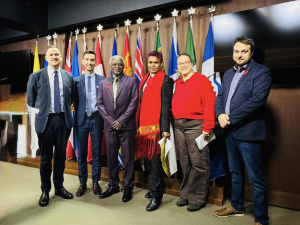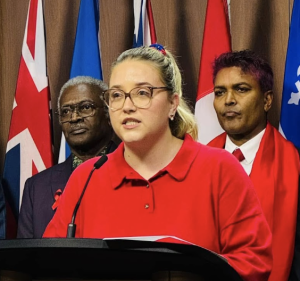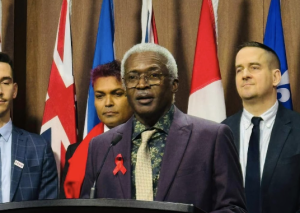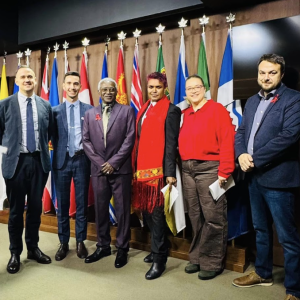PARUJEE AKARASEWI • NOV 28, 2024

On this World AIDS Day, it’s with a heavy heart that we address Canada’s continued failure to reform its criminal laws surrounding HIV non-disclosure. Despite years of advocacy, collaboration, and promises from the federal government, those living with HIV remain subject to unjust criminalization, perpetuating stigma, fear, and harm.
The land we stand on belongs to the unceded and unsurrendered territory of the Anishinaabe Algonquin people. This acknowledgment underscores the broader injustices we seek to address, including the systematic marginalization of people living with HIV.

Alexander McClelland, the chair of the Steering Committee of the Canadian
Coalition to Reform HIV Criminalization (Parujee Akarasewi/CHUO)
Canada’s Global Reputation
Canada holds the shameful distinction of being a global leader in prosecuting people living with HIV for non-disclosure, with over 225 cases since 1989. These prosecutions often rely on sexual assault laws, even in cases where there was no intent to harm, no significant risk of transmission, or precautions were taken. Despite revolutionary advancements in HIV science and widespread international consensus against such criminalization, the government has failed to act meaningfully.
In 2018, the federal government acknowledged the “over-criminalization” of HIV non-disclosure, implementing a directive limiting such prosecutions in federal jurisdictions. Yet, this action was limited to the territories and failed to extend to provinces where the majority of prosecutions occur. Subsequent consultations and reports reinforced the need for reform, but no substantive legislative changes have followed.
This year, the government informed advocates that there is “no longer a path forward” for reform before the next federal election in 2025. This decision is a devastating betrayal to the 65,000 people living with HIV in Canada, who continue to live under the threat of prosecution.

Katarina Bogosavljevic, PhD candidate at the University of Ottawa, and a steering committee member of the Canadian Coalition to Reform HIV Criminalization (Parujee Akarasewi/CHUO)
The Real Impact of Criminalization
HIV criminalization disproportionately harms marginalized communities, particularly Black and Indigenous people, and those without Canadian citizenship, who face harsh sentences, stigma, and even deportation. Criminalization fosters a climate of fear, discouraging people from getting tested or accessing treatment that could make them undetectable and untransmittable.
For those convicted, the consequences are severe and lifelong. Individuals are often placed on sex offender registries, facing job loss, social isolation, and ongoing surveillance. These punitive measures have no basis in science and undermine public health efforts.

Colin Johnson, member of the Canadian Coalition to Reform HIV Criminalization, and Co-Chair of the Toronto Harm Reduction Alliance (Parujee Akarasewi/CHUO)
As Colin Johnson, a member of the Canadian Coalition to Reform HIV Criminalization, notes, “The law perpetuates racism, discrimination, and fear. It punishes people for their health rather than supporting them.”
A Personal Story
Chris Tooriram, an HIV advocate living with the virus for 25 years, shares his harrowing experience. Over two decades ago, he was charged with aggravated sexual assault for kissing someone—a situation that posed zero risk of transmission. After disclosing his status, he was brutally attacked. Despite the science, he faced criminal charges while his attacker walked free.
Stories like Chris’s highlight the cruelty of Canada’s laws. They also show why many people fear disclosure, testing, and treatment, exacerbating the very issues these laws claim to address.

Khrishna Desmond Florecita Turiram, MSM Ethno-Cultural Resource Coordinator
AIDS Committee of Ottawa (Parujee Akarasewi/CHUO)
What Needs to Change
The Canadian Coalition to Reform HIV Criminalization has worked tirelessly to propose evidence-based solutions. In 2022, the coalition developed a Community Consensus Statement calling for HIV criminalization to be a last resort, limited to cases of intentional and actual transmission.
Advocates demand: Removing HIV non-disclosure from sexual assault law, ensuring laws align with scientific evidence about transmission risks, and consistent legal standards across provinces to provide clarity and certainty for people living with HIV.
Even feminist organizations and legal experts support removing HIV non-disclosure from sexual assault law, recognizing its inappropriate use and the stigma it perpetuates.

André Capretti, a lawyer and a Policy Analyst at the HIV Legal Network, and member of the Coalition (Parujee Akarasewi/CHUO)
The Government’s Failure
The government’s inaction contradicts its commitments. Prime Minister Justin Trudeau himself acknowledged the harm of these laws, stating last year that they “over-criminalize and stigmatize people living with HIV.” International bodies like UNAIDS have also repeatedly urged Canada to change its approach.
Yet, despite years of consultations, reports, and promises, the government has abandoned reform efforts. This decision tells people living with HIV that their rights and lives are secondary.
Moving Forward
This is not the end. The Coalition remains steadfast in its fight for justice, human rights, and evidence-based policies. People living with HIV are resilient, and the movement to end criminalization will continue.
HIV is not a crime. It is time Canada starts acting like it.

